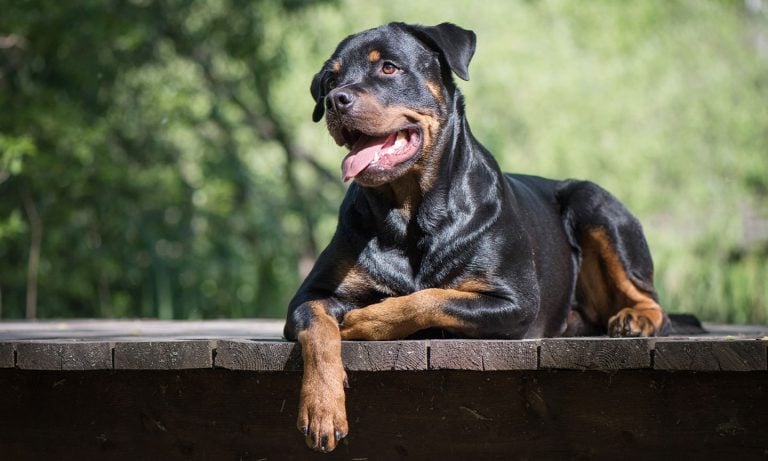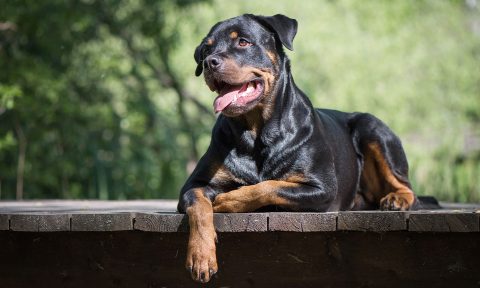Chihuahua vs Rottweiler

Breed Snapshot
Best For
Equal parts affectionate, charming and mischievous, Chihuahuas are small, adaptable dogs who thrive in households (small and large!) with no other dominant pets. This toy breed's ideal pet parent provides companionship, care and lots of...
Equal parts affectionate, charming and mischievous, Chihuahuas are small, adaptable dogs who thrive in households (small and large!) with no other dominant pets. This toy breed's ideal pet parent provides companionship, care and lots of attention.
Chihuahua Temperament
Chihuahuas are charming little scamps with an eye for mischief and a sense of bravery that outsizes their physicality. They’re playful pups who enjoy a good romp or game, even though it may not last long (depending on their energy level). And they love to snooze on laps an...
Chihuahuas are charming little scamps with an eye for mischief and a sense of bravery that outsizes their physicality. They’re playful pups who enjoy a good romp or game, even though it may not last long (depending on their energy level). And they love to snooze on laps and cuddle—that is, after all, what they’re bred to do.
They like a lot of attention and are quite portable. But even though they’re easily carried, they do still need to learn how to walk on their own and be able to engage in normal dog behaviors, like sniffing, exploring and playing. In other words, don’t pop them in a purse or a stroller and tote them everywhere—unless, of course, it’s somewhere risky with lots of feet that could hurt a tiny paw, like an airport or street festival.
The Chihuahua dog breed is said to resemble a terrier with their demeanor and can become quite feisty, especially if they feel threatened. Some sites report that the Chihuahua bite force is 3,900 pounds per square inch (psi), but those so-called Chihuahua facts are wildly inaccurate, when a lion is only at 600 psi. In truth, Chihuahuas usually inflict no more than a Level 1-3 bite, with no puncture deeper than half the length of one of their canine teeth.
To help your Chihuahua puppy overcome a nipping or protective tendency, socialize them by safely and slowly introducing them to new people and places from the get-go and start training when they are young. Early training will also help this smallest of dog breeds become wonderfully friendly and receptive to all members of the family, including other pets.
Chihuahua Traits

Breed Snapshot
Best For
A popular working breed, Rottweilers do best with experienced pet parents who can provide early training and socialization. These robust, large-sized dogs thrive in homes with active individuals or families, appreciating both mental and physical...
A popular working breed, Rottweilers do best with experienced pet parents who can provide early training and socialization. These robust, large-sized dogs thrive in homes with active individuals or families, appreciating both mental and physical challenges.
Rottweiler Temperament
Rottweilers are powerful and intelligent dogs who benefit from early training and socialization. They are easy to train and eager to please their families, but are also strong-willed and may seem aloof to the outside world. Originally descending from the mastiffs of the Roman legions, Rottweilers have been valuable...
Rottweilers are powerful and intelligent dogs who benefit from early training and socialization. They are easy to train and eager to please their families, but are also strong-willed and may seem aloof to the outside world.
Originally descending from the mastiffs of the Roman legions, Rottweilers have been valuable companion animals and working dogs for centuries. This is just as true today as it was years ago—families that are willing to put in the time to train and socialize their Rottweiler will be rewarded with an intensely loyal and energetic dog.
In fact, Rottweilers are much more emotionally needy than many people assume. This dog has a fearsome reputation, but in reality, Rottweilers are obsessed with their people and want to be around them all the time. Rottweilers who are isolated from people or kept alone may begin to exhibit unwanted behaviors when they do finally get access to people.
Rottweilers were originally bred to be protectors. Combined with their great strength, this makes it especially important that Rottweilers are properly trained and socialized. Once socialized, Rottweilers can easily get along with other dogs and young children. Like any dog, Rottweilers who are poorly trained, subjected to harsh discipline, or isolated are more likely to exhibit unwanted fear-based behaviors, including biting and aggression.
One especially interesting features of these dogs is their vocalization. Rottweilers aren’t known for excessive barking (although of course they can and will bark), but they do have a deep rumble that sounds almost like a growl. Some pet parents think of this rumbling sound as “talking.” This “Rottie rumbling” is almost like the purring of a giant cat and often means your Rottweiler is happy and content, particularly during belly rubs.




